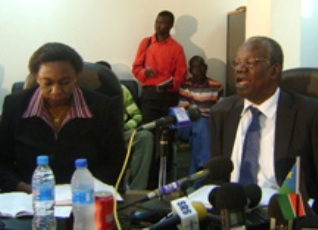South Sudan tightens drug import regulations
By Julius N. Uma
August 31, 2010 (JUBA) – The Government of Southern Sudan (GoSS) has instituted strict measures to curb the import of expired drugs into the semi-autonomous region, Dr. Luka Manoja, the Health Minister said yesterday.

“Of late we have received cases of expired drugs from neighboring countries being transported and sold in southern Sudan. We have instructed organizations monitoring standards of good to be very vigilant and confiscate such products,” Dr. Manoja told a weekly media briefing held at the Information and Broadcasting Ministry.
The Minister, who was flanked by the Undersecretary in the Health Ministry, Dr. Olivia Lomuro also decried the low levels of health care coverage in the region, mainly attributing it to poor infrastructures and financials constraints.
Dr. Manoja castigated the Government of National Unity (GoNU) and the international community for alleged failure to provide infrastructural support to southern Sudan, after over two-decades of a bloody civil war that killed millions and destroyed numerous properties.
“Up to now, we still experience very low health coverage simply because rapid response is slow due to poor roads linking some rural locations,” he said, adding that, “The support we expected from the national government and the international community never came to be fulfilled in reality,” he said.
Citing the alarming rates of child and maternal mortality in the region, the Health Minister said his Ministry had embarked on an infrastructural and human resource development programme that will involve road construction, building of health structures, training of nurses, midwives and other medical personnel.
The program, said the minister, will witness the supply of essential commodities, drugs and equipments to the various health sectors within the region, with assistance from the Multi-Donor Trust Fund (MDTF) – run by UN Development Program (UNDP) to administer funding from the UN, national governments and donors.
According to official estimates from the Reproductive Health Department in the Health Ministry, Maternal Mortality Ratio (MMR) in southern Sudan stands at 1,700 deaths per 100,000 live births. The minister said that according to the 2004 Millennium Development Goals (MDGs) report on South Sudan the regions MMR figures are the fifth highest globally after, Sierra Leone, Afghanistan, Malawi and Angola.
Sudan as a whole is the 135th worst place to have a child in terms of the likelihood that the mother will die with 306.3 deaths per 100,000 births.
The percentage of deliveries attended by trained birth attendants (not necessarily skilled) is reportedly 5%, with extremely low contraceptive prevalence rates attributed at just 1%, the minister said quoting the 2004 Millennium Development Goals (MDGs) report.
According to Dr. Manoja, absence of qualified health personnel remains a big challenge. High levels of doctors and nurses travelling abroad in search of better pay and working conditions – a phenomenon known as the brain drain – have been a set-back to normal functioning of Southern Sudan’s health centers the minister said.
Recent statistics from the Health Ministry indicate that south Sudan has 42 hospitals, 210 Primary Health Care (PHC) centers, 14 treatment sites for HIV/Aids and 72 Voluntary Counseling and Testing (VCT) centers.
The Ministry of Health Undersecretary said limited awareness on health-related matters especially among rural communities still undermines efforts by the ministry to address health problems in the region.
According to Dr. Lomuro, a 2006 Sudan Household Survey conducted by the Ministry put health awareness in the region at a mere 10 percent, a statistic she said remains worrying.
Plans are underway at the Health Ministry to register all medical practitioners in the region. The exercise, to be carried out by Sudan Medical Council, is meant to curb the illegal sale of drugs as well as catch unqualified medical personnel.
(ST)

Achouth
South Sudan tightens drug import regulations
The ministry of Health in the region of South Sudan need to tightens rule of law in relation to health to ensure lives innocents are not loss due to black markets where expired medications find their ways into the region of such high illiteracy. GoSS should be the eye of southerners at this time before an average southerner can be able to read what treatment are they undergoing when it comes to taking medications
Good work Dr. Manoja
Nyok Achouth
Jakok Loakloak
South Sudan tightens drug import regulations
Finally we have a qualified person in the most vital institution in Southern Sudan; the Ministry of Health. Beside the good steps you have taken Mr. Minister, can you please tackle the issue of the “minor radiants” released monthly by the North in our waters that cause diarrhea, nausea, and the infamous choleric deseases that are slowly killing our people in and arround Juba?
And please, put an end to the careless trashing of Juba. Make the throwing of those crystals of water(s) illigal in juba and the south so we can at least drink from the Nile “our only pure inheritance” that can not be influenced by the synical corruption in Juba..